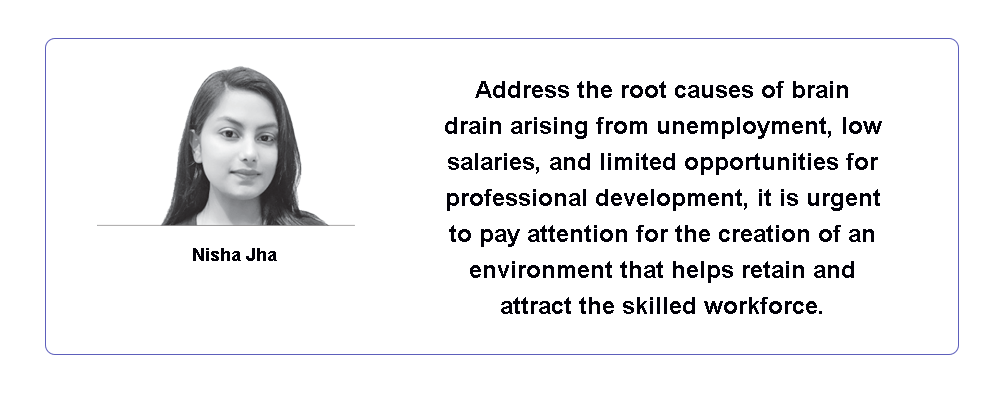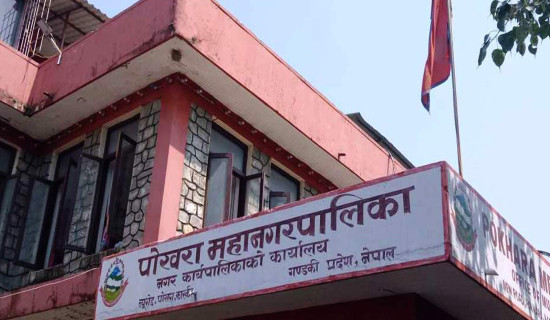- Tuesday, 23 December 2025
Nation Needs To Prevent Brain Drain
Nepal's burgeoning youth population is poised to deliver a significant boost to the national economy in the years to come. Dubbed the "population dividend", this phenomenon occurs when any nation’s working-age population grows faster than the number of dependents, leading to increased productivity, higher incomes, and greater potential for economic growth.
According to the latest population census, the country's working-age population stands at an impressive 61.96 per cent of the total population. This represents a significant proportion of the population that can potentially drive economic growth and development in the country. However, the realisation of this potential requires the right policies and investments in areas such as education, healthcare, and job creation.
Opportunity
Nepal's population presents a significant opportunity for economic growth, but the brain drain threatens to undermine this potential. While the growing working-age population can drive development, the migration of highly skilled individuals to other countries can hinder progress, leaving policymakers with the task of creating an environment that retains and attracts this valuable talent. Failure to address the root causes of the brain drain could have long-lasting implications for the nation’s bid to achieve development and prosperity. Despite the potential benefits of a large youth population, young people often face barriers to participating in politics and may feel disillusioned with the government and their country's prospects. This can lead to brain drain, as talented young people seek opportunities abroad.
Globalisation and the easy access to information about other countries and cultures can create unrealistic expectations among young people. The rise of YouTube vlogs showcasing a luxurious and standard way of living abroad has created a sense of hustle and aspiration in the minds of young people. This virtual world offers a glimpse into a life that seems unattainable in their home country, leading many to dream of moving overseas. They may feel that they have better opportunities and prospects elsewhere.
As a phenomenon that plagues many developing nations, brain drain is a pressing issue for Nepal. This loss of human capital can hinder the country's economic, social, and cultural growth, as the best and brightest are often the ones who leave. This problem can also exacerbate existing inequalities in the nation, as those who can afford to leave are often from privileged backgrounds, leaving behind those who may not have the same opportunities for advancement. In order to address the root causes of brain drain arising from unemployment, low salaries, and limited opportunities for professional development, it is urgent to pay attention for the creation of an environment that helps retain and attract the skilled workforce.
The causes of the brain drain are multifaceted and complex, stemming from a range of economic, social, and political factors. In terms of economic causes, the country’s limited job market and low wages for highly skilled workers often make it difficult for individuals to find work commensurate with their qualifications and experience. This, in turn, creates a sense of frustration and disillusionment, prompting many to seek better opportunities abroad. Additionally, political instability and poor governance have contributed to brain drain by creating an uncertain and unstable environment, which often results in a lack of investment and limited economic opportunities. Finally, a lack of access to quality education and professional development opportunities is also a contributing factor, as many highly skilled individuals seek opportunities for growth and advancement that are not available within the nation.
Stopping the country’s issue of brain drain requires an adaptable approach. The government must invest in creating an enabling environment for the country's workforce by improving working conditions, increasing salaries, and job prospects. This can be achieved through formulating policies that encourage entrepreneurship, attract foreign investment, and promote innovation. Furthermore, the education sector must be revamped to produce a skilled workforce that can meet the needs of the modern economy. Additionally, efforts must be made to address social inequalities such as access to healthcare, gender discrimination, and income disparities, which often push people to leave in search of better opportunities.
Concerted efforts
Ultimately, the solution to the brain drain problem requires a concerted effort from all stakeholders, including the government, private sector, and civil society. They need to contribute to creating a thriving and equitable society that values its human capital. To address these issues, governments and other institutions must take steps to empower young people and create a more inclusive political environment. This may involve providing opportunities for youth leadership and participation, as well as investing in education and other essential services. It is also important to create a more positive and supportive environment for young people, with policies that encourage entrepreneurship and innovation, and a commitment to protecting civil liberties and promoting free speech.
(Ms. Jha is pursuing her MA in Economics at Patan Multiple Campus.)

















